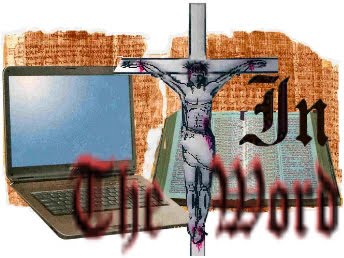WHAT ABOUT THE APOSTLE JOHN AND HIS WRITINGS?
Can you believe that John really wrote the Gospel and letters, and told the truth?
God does want the believer to believe, but He also provides anchors to hook our belief and trust onto.
A fragment of John’s Gospel, chapter 18, was found deep in Egypt, which dates back to mid 100 AD. That means that John’s writings had spread hundreds of miles in spite of persecution and opposition, in just a few decades after Jesus’ death and resurrection, and much less time after John’s death. It is generally recognized the John lived into his 90s.
Fragment of St John's Gospel: rectoChapter 18, verses 31...33
P. Ryl. Gk. 457. Fragment of a leaf of a papyrus codex, 8.-9 x 5.8 em.; text 6.4 x 6 em.; upper margin and part of inner margin preserved. Written in dark ink on papyrus-light in colour and of good quality. On verso a kollema or perhaps part of a strengthening strip to cover the fold of the sheet. First half of the second century.
The John. Rylands University Library, The University of Manchester, Oxford Road, Manchester, - M13 9PP; UK.
I Contact details I Feedback
The University of Manchester, Royal Charter Number: RC000797
St John fragment
Greek papyri in the John Rylands Library
An unpublished fragment of the fourth gospel
Fragment of St. John's gospel. Larger versions of both sides, recto and verso are available.This small fragment of St. John's Gospel, less than nine centimetres high and containing on the one side part of verses 31-33, on the other of verses 37-38 of chapter xviii is one of the collection of Greek papyri in the John Rylands Library, Manchester.
It was originally discovered in Egypt, and may come from the famous site of Oxyrhynchus (Behnesa), the ruined city in Upper Egypt where Grenfel and Hunt carried out some of the most startling and successful excavations in the history of archaeology; it may be remembered that among their finds of new fragments of Classical and Christian literature were the now familiar "Sayings of Jesus".
St John fragment
An unpublished fragment of the fourth gospel
"The importance of this fragment is quite out of proportion to its size, since it may with some confidence be dated in the first half of the second century A.D., and thus ranks as the earliest known fragment of the New Testament in any language.
It provides us with invaluable evidence of the spread of Christianity in areas distant from the land of its origin; it is particularly interesting to know that among the books read by the early Christians in Upper Egypt was St. John's Gospel, commonly regarded as one of the latest of the books of the New Testament.
Like other early Christian works which have been found in Egypt, this Gospel was written in the form of a codex, i.e. book, not of a roll, the common format for non-Christian literature of that time."


